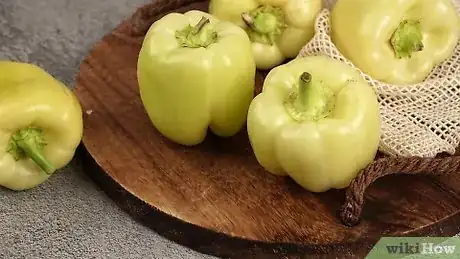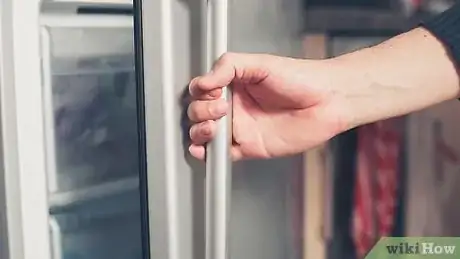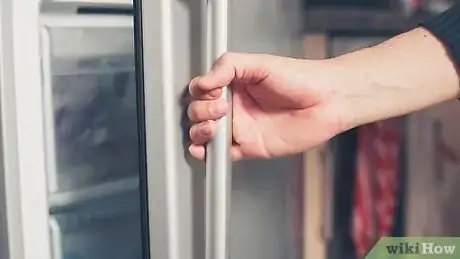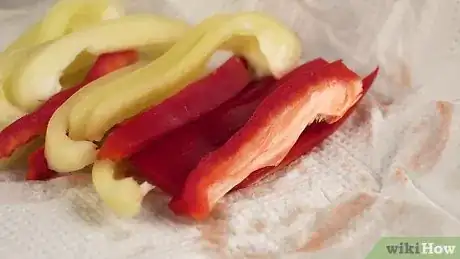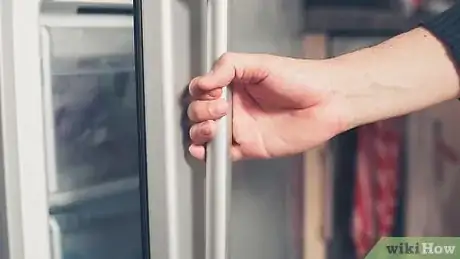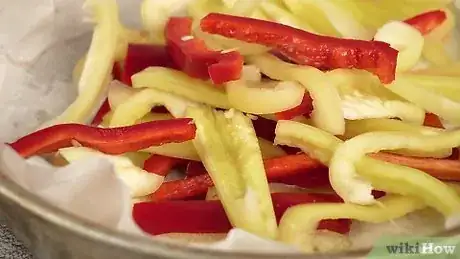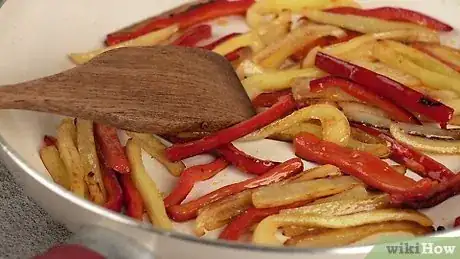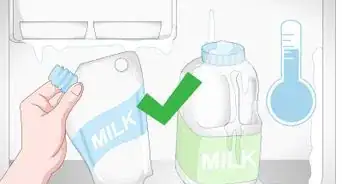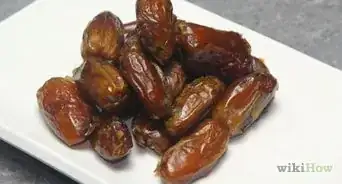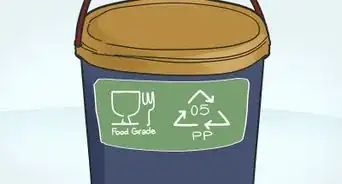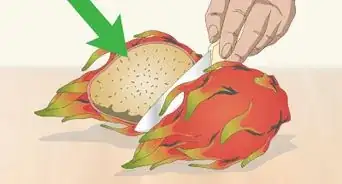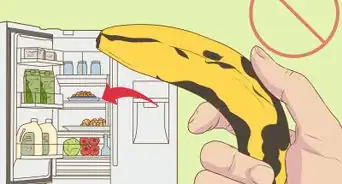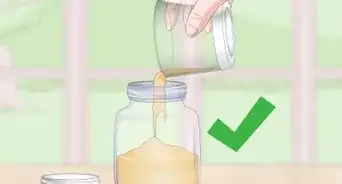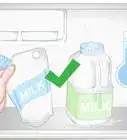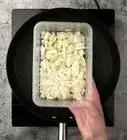This article was co-authored by wikiHow Staff. Our trained team of editors and researchers validate articles for accuracy and comprehensiveness. wikiHow's Content Management Team carefully monitors the work from our editorial staff to ensure that each article is backed by trusted research and meets our high quality standards.
There are 12 references cited in this article, which can be found at the bottom of the page.
The wikiHow Culinary Team also followed the article's instructions and verified that they work.
This article has been viewed 193,305 times.
Learn more...
Fresh, colorful bell peppers are a tasty addition to any meal. If they are not stored properly, however, peppers might go bad before you can use them. It is important to keep both whole and chopped bell peppers in the fridge so that they do not spoil. If you want to keep them fresh for a long time, you can even try freezing them. Just make sure that you throw them out when they become slimy or moldy.
Steps
Keeping Whole Bell Peppers
-
1Store peppers without washing them. Any moisture on the pepper will make it rot faster in the fridge. Wait until you are ready to cook the pepper before you wash it.[1]
- If you did end up washing your bell peppers, make sure that they are completely dry before putting them in the fridge. Pat them dry with a paper towel.
-
2Put peppers in a produce bag. Produce bags are made from mesh, which gives the peppers plenty of air. If you don’t have a produce bag, take a plastic grocery bag and poke a few holes in it.[2]
- Do not tie or knot the bag closed. You will need airflow to keep the peppers fresh.
- Do not store peppers in an airtight bag. This will make them spoil faster.
Advertisement -
3Place bell peppers in the refrigerator's vegetable drawer. The drawer will keep them fresh and crisp. Spread out the peppers as much as possible. If the drawer is tightly packed, they may not last as long.[3]
- Do not keep peppers in the same drawer as fruits. Fruits release a gas called ethylene, which can cause vegetables to rot faster.[4]
-
4Throw out bell peppers when they become too soft. Press lightly against the pepper’s skin with your fingertips. If the skin is firm and smooth, the pepper is still good. If it feels slightly spongy or wrinkled, you can cook the pepper, but don’t eat it raw. If the pepper is slimy or very soft, toss the pepper.[5]
- If you notice any mold on your peppers, throw them out, no matter how long you have had them.
- Whole bell peppers can be stored for up to 2 weeks in the fridge.[6]
Saving Chopped Peppers
-
1Wrap the chopped peppers in a paper towel. The paper towel will keep them from getting too slimy or damp in the refrigerator.[7]
-
2Put chopped bell peppers in an airtight container or plastic bag. Keep the peppers wrapped in the paper towel. The container should be completely sealed. Do this within 2 hours of chopping to keep them from spoiling.[8]
-
3Place the chopped peppers in the drawer or top shelf of the fridge. Since the peppers are already chopped and sealed in a container, they do not necessarily need to be in the drawer.[9]
-
4Throw chopped peppers out after 3 days. Chopped peppers will not last very long. If they start to become slimy or moldy, toss them out, regardless of how long they have been in the fridge.[10]
Freezing Bell Peppers
-
1
-
2Spread the bell peppers on a cookie sheet or tray. Arrange the chopped pieces in a single layer. Do not stack them on top of one another or they might stick together when frozen.[12]
-
3Freeze the cookie sheet for 1 hour. Slide the cookie sheet into the freezer. Make sure nothing is on top of or touching the peppers. After an hour, remove the tray from the freezer.[13]
-
4Place the frozen peppers in a freezer bag or airtight container. Use freezer bags for the best results. After you place the peppers inside, squeeze out as much air as possible before sealing the bag. If you use a container, make sure it has a sturdy lid that screws on tightly. Put the peppers back on a shelf in the freezer.[14]
- Write the date on the plastic bag or container using a marker. Bell peppers will last up to a year in the freezer. If they start to look discolored or wrinkled, throw them out.[15]
-
5Thaw the peppers if you want to eat them raw. To defrost the peppers, move them to the fridge a day before you need them. You can also use the defrost setting on your microwave.
-
6Cook the peppers while they are still frozen. Do not thaw the peppers if you are going to cook them. Instead, just go ahead and toss them into your recipe.[16]
Community Q&A
-
QuestionDo I wash the bell peppers before freezing them or after I take them out?
 Community AnswerI wash before freezing, sometimes I even cut them, because then I can use them straight out of the freezer after they've defrosted.
Community AnswerI wash before freezing, sometimes I even cut them, because then I can use them straight out of the freezer after they've defrosted.
Things You'll Need
- Peppers
- Produce bag or plastic grocery bag
- Plastic zip bag
- Freezer bag
- Airtight plastic container
- Paper towel
References
- ↑ https://www.realsimple.com/food-recipes/shopping-storing/food/select-store-cook-summer-produce#buying-storing-preparing-bell-peppers
- ↑ https://www.thekitchn.com/the-kitchns-guide-to-storing-fruits-and-vegetables-tip-roundup-176308
- ↑ https://www.eatbydate.com/vegetables/fresh-vegetables/bell-peppers/
- ↑ https://www.thekitchn.com/the-kitchns-guide-to-storing-fruits-and-vegetables-tip-roundup-176308
- ↑ https://www.eatbydate.com/vegetables/fresh-vegetables/bell-peppers/
- ↑ http://www.stilltasty.com/fooditems/index/16523
- ↑ https://www.craftsy.com/blog/2014/01/storing-cut-vegetables/
- ↑ https://anrcatalog.ucanr.edu/pdf/8004.pdf
- ↑ https://greatist.com/eat/ultimate-way-organize-your-fridge
- ↑ http://www.stilltasty.com/fooditems/index/16523
- ↑ https://food.unl.edu/freezing-sweet-bell-and-hot-peppers
- ↑ https://food.unl.edu/freezing-sweet-bell-and-hot-peppers
- ↑ https://food.unl.edu/freezing-sweet-bell-and-hot-peppers
- ↑ https://anrcatalog.ucanr.edu/pdf/8004.pdf
- ↑ http://www.stilltasty.com/fooditems/index/16523
- ↑ https://spoonuniversity.com/how-to/defrosting-frozen-vegetables-like-a-pro-tips-and-tricks-for
About This Article
To store whole bell peppers, avoid washing them until you’re ready to use them. Moisture will make them go bad faster. Put the peppers in a mesh produce bag and store them in the vegetable drawer in your fridge for up to 2 weeks. To store chopped-up bell peppers, wrap the pieces in a paper towel and place them in an airtight container. Keep the container on the top shelf or in the vegetable drawer of your fridge for no more than 3 days. For longer storage, spread out the pepper pieces on a baking sheet and freeze them for about an hour, then transfer them to an airtight, freezer-safe container. Store the frozen peppers in the freezer for up to 1 year. To learn how to best thaw your frozen peppers, keep reading!
